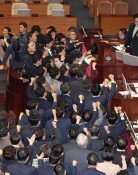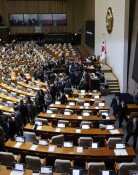Sector-specific minimum wage proposal dismissed again
Sector-specific minimum wage proposal dismissed again
Posted July. 04, 2024 08:19,
Updated July. 04, 2024 08:19
The proposal to apply sector-specific minimum wages was dismissed due to conflict between employers and workers. The Minimum Wage Committee, composed of nine members from the labor, management, and public sectors, held the seventh plenary meeting two days ago and rejected the proposal with fifteen opposing votes, eleven votes in favor, and one invalid vote. Discussions intensified and shouting broke out, and some labor committee members committed actions to block voting, taking away the gavel of the Minimum Wage Committee Chairman and tearing up ballot papers.
At the meeting, employer committee members (management) requested a differential application of minimum wage at restaurants, taxi companies, convenience stores, etc., citing the reduced ability of small business owners to pay due to rapid increases in the minimum wage in recent years. Labor committee members (labor groups) opposed the request, claiming that it would undermine the purpose of the minimum wage system and stigmatize low-wage industries. After more than three hours of debate, the chairman decided to put the motion to a vote, which was interrupted by the worker committee members recommended by the Korean Confederation of Trade Unions. The opposition was because voting could not be held when the inclinations of public sector members newly appointed by the government in May were not clarified.
Any action to obstruct voting at a statutory deliberation body that decides on issues with a significant economic impact should not be tolerated, no matter what. The legitimacy of the voting results was also undermined due to suspicions that the use of physical force could have influenced the voting. Amid rising conflict between labor and management, there are also concerns about minimum wage deliberations, which are facing difficulties. Employer committee members decided not to attend the eighth plenary meeting scheduled for today.
The need to apply differential minimum wages has been tabled for several years. As the minimum wage was raised abruptly without considering impacts on productivity and employers’ payment abilities, small business owners and SMEs had to bear rising labor costs. More than 30% of employers cannot afford to pay the minimum wage in the agriculture, forestry, fishing, food, and lodging industries. Employers have reduced hiring, with a rising number of business owners earning less than their employees. The labor community should understand these circumstances, rather than opposing for the sake of opposing, and cooperate so that the minimum wage can be reasonably adjusted.
We should also take this opportunity to consider revamping the minimum wage decision-making process, where extreme confrontations are repeated like an annual event. Unlike most developed countries, where an independent committee or expert group determines the minimum wage, Korea hosts a ‘nationwide wage negotiation’ where stakeholders convene in a wasteful power struggle. Since implementing the minimum wage system in 1988, only seven rounds of decisions have been made through labor-management agreements. We need to revise the system so that the minimum wage is reasonably determined by analyzing macroeconomic conditions and changes in the labor market.







